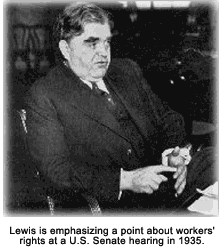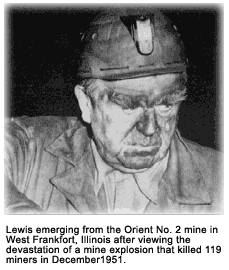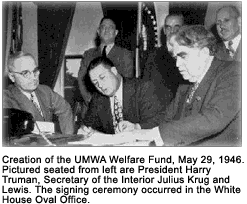John L. Lewis was a powerful labor leader, who through the Congress of Industrial Organizations(CIO), helped raise living standards for millions of American families in the 1930s. He was also a giant among American leaders in the first half of the 20th century, regularly advising presidents and challenging America's corporate leaders.
The early years
John Llewellyn Lewis was born February 12, 1880, in Cleveland, Iowa, the son of a Welsh immigrant coal miner. He became a coal miner at the age of 15 after settling in Panama, Illinois, a small town in the central part of the state. Between the years 1898 and 1907, Lewis also tried farming, construction work, and a small business, before joining the labor movement, in 1907.
Lewis was voted to be a local delegate to the United Mine Workers of America (UMWA) convention in 1906, which marked the beginning of Lewis' quick rise as a leader of laborers. In 1909, he would serve, successively, as president of the Panama local of the United Mine Workers of America, and later as a lobbyist for the UMW.
The following year he would be elected as an Illinois representative on UMW's state legislature. He took a national position in the American Federation of Labor (AFL), as an organizer, in 1911. In five years, Lewis was the UMWA convention's pro-tem president and appointed chief statistician for the union.
 In 1917, John P. White resigned as president of the UMW, and vice president Frank J. Hayes succeeded him. President Hayes appointed Lewis vice president, but due to president Hayes' alcoholism, Lewis assumed Hayes' duties in 1919, by becoming acting president. He was elected president of the UMWA in 1920.
He held this post until 1960, when he retired and was then named president emeritus. Perhaps Lewis' greatest legacy to the UMW workers was the establishment of a UMWA Welfare and Retirement Fund in a contract with the federal government and signed in the White House with President Harry S. Truman attending.
In 1921, Lewis ran for the presidency of the A.F.L., but would lose to his opponent, Samuel Gompers, by a two-to-one margin. And in the following year, he would disagree with labor activist Mother Jones over whether to set a date for the Kansas coal workers to strike against the “Industrial Slave Law,” which was designed to prevent coal workers from striking.
Jones felt the rank-and-file workers ought to set the strike date, not the attendees of the United Mine Workers' Convention. This event led to her resignation from the UMW.
Lewis and eight other major union leaders formed the Committee for Industrial Organizations (CIO) within the A.F.L. in 1935, having realized that any gains that Lewis won for miners could be lost if he did not organize the "captive mines," such as those held by the steel producers United States Steel Company.
In a deal with J.P. Morgan in 1901, U.S. Steel had become a powerful force in industry, employing 170,000 workers alone. That required organizing the steel industry, which had defeated union organizing drives in 1892 and 1919, and which had fiercely resisted all organizing efforts.
They had blacklisted union supporters and intimidated workers through the Coal and Iron Police, and other law enforcement authorities under its control. Very much an anti-communist leader, Lewis also feared that if organized labor did not represent these workers, then communists and other radicals on the left would.
The task of organizing steelworkers, on the other hand, drove a wedge between the CIO and the A.F.L., which was controlled by craft unionists who looked down on both industrial workers and industrial unions, as unskilled laborers. Tensions between them snapped when Lewis punched William Hutcheson, the president of the Carpenters Union, for making slighting comments at Atlantic City convention in 1935, about an unskilled rubber worker delivering an organizing report.
By 1937, Lewis had reached his greatest stature as a labor leader, but that status would not last long. Lewis would lose influence in the White House during the next two years.
In November of 1938, the committee changed its name to the Congress of Industrial Organization after being expelled from the A.F.L., Lewis served as its first president and in 1940, openly broke with President Franklin Delano Roosevelt when he pledged that if Wendell Willkie didn't win the presidency over, he would retire.
Lewis, who was a Republican, had initially supported Roosevelt for his first two terms, but later began to feel Democrat Roosevelt did not support labor unions and that if a Republican candidate were elected with the help of labor votes, the union would be rewarded. With Roosevelt's re-election, however, Lewis resigned from the CIO, but continued as president of the UMW.
Lewis would damage his reputation further, when in 1941, on the eve of America's entrance into World War II and in 1943, Lewis led over half-a-million mine workers on strike, demanding wage increases even while other labor unions were operating under a general no-strike policy in support of the war effort. The government called the strike illegal and ordered the miners back to work but only 15,000 workers returned. The strike closed down steel mills for two weeks during the height of the war; power shortages threatened to cripple the war effort.
Outright opposition to Lewis led to students burning his effigy, and rocks being hurled through the window of his Alexandria, Virginia home. Yet to miners, Lewis was a hero.
In the middle of the war, he would order his miners on strikes to raise their wages and better their working conditions. By leading four national coal strikes, it seemed Lewis relished the guerrilla war he was having against other labor leaders, Congress, and the White House. Between the years 1945 and 1950, he rejoined and also impetuously left the A.F.L.
He fought aggressively against the anti-labor Taft-Hartley Act of 1947, which he called “the first ugly savage thrust of Fascism in America.” This anti-labor backlash act outlawed the Closed Shop, made unions liable for damages caused by breaches of contract, required a 60-day “cooling off period” before striking, forbade unions from making political contributions or extracting excessive dues, and required elected union officials to take an oath stating they were not Communists.
While serving as chairman of the Republican party's National Labor Committee, he won a reputation as a "labor statesman," but he dominated a declining union in a sick industry where wages were low and working conditions where hideous. To critics, Lewis appeared to be "merely a labor boss of the most conventional kind," and autocratic "per capita counter" and a "power seeker."
In 1917, John P. White resigned as president of the UMW, and vice president Frank J. Hayes succeeded him. President Hayes appointed Lewis vice president, but due to president Hayes' alcoholism, Lewis assumed Hayes' duties in 1919, by becoming acting president. He was elected president of the UMWA in 1920.
He held this post until 1960, when he retired and was then named president emeritus. Perhaps Lewis' greatest legacy to the UMW workers was the establishment of a UMWA Welfare and Retirement Fund in a contract with the federal government and signed in the White House with President Harry S. Truman attending.
In 1921, Lewis ran for the presidency of the A.F.L., but would lose to his opponent, Samuel Gompers, by a two-to-one margin. And in the following year, he would disagree with labor activist Mother Jones over whether to set a date for the Kansas coal workers to strike against the “Industrial Slave Law,” which was designed to prevent coal workers from striking.
Jones felt the rank-and-file workers ought to set the strike date, not the attendees of the United Mine Workers' Convention. This event led to her resignation from the UMW.
Lewis and eight other major union leaders formed the Committee for Industrial Organizations (CIO) within the A.F.L. in 1935, having realized that any gains that Lewis won for miners could be lost if he did not organize the "captive mines," such as those held by the steel producers United States Steel Company.
In a deal with J.P. Morgan in 1901, U.S. Steel had become a powerful force in industry, employing 170,000 workers alone. That required organizing the steel industry, which had defeated union organizing drives in 1892 and 1919, and which had fiercely resisted all organizing efforts.
They had blacklisted union supporters and intimidated workers through the Coal and Iron Police, and other law enforcement authorities under its control. Very much an anti-communist leader, Lewis also feared that if organized labor did not represent these workers, then communists and other radicals on the left would.
The task of organizing steelworkers, on the other hand, drove a wedge between the CIO and the A.F.L., which was controlled by craft unionists who looked down on both industrial workers and industrial unions, as unskilled laborers. Tensions between them snapped when Lewis punched William Hutcheson, the president of the Carpenters Union, for making slighting comments at Atlantic City convention in 1935, about an unskilled rubber worker delivering an organizing report.
By 1937, Lewis had reached his greatest stature as a labor leader, but that status would not last long. Lewis would lose influence in the White House during the next two years.
In November of 1938, the committee changed its name to the Congress of Industrial Organization after being expelled from the A.F.L., Lewis served as its first president and in 1940, openly broke with President Franklin Delano Roosevelt when he pledged that if Wendell Willkie didn't win the presidency over, he would retire.
Lewis, who was a Republican, had initially supported Roosevelt for his first two terms, but later began to feel Democrat Roosevelt did not support labor unions and that if a Republican candidate were elected with the help of labor votes, the union would be rewarded. With Roosevelt's re-election, however, Lewis resigned from the CIO, but continued as president of the UMW.
Lewis would damage his reputation further, when in 1941, on the eve of America's entrance into World War II and in 1943, Lewis led over half-a-million mine workers on strike, demanding wage increases even while other labor unions were operating under a general no-strike policy in support of the war effort. The government called the strike illegal and ordered the miners back to work but only 15,000 workers returned. The strike closed down steel mills for two weeks during the height of the war; power shortages threatened to cripple the war effort.
Outright opposition to Lewis led to students burning his effigy, and rocks being hurled through the window of his Alexandria, Virginia home. Yet to miners, Lewis was a hero.
In the middle of the war, he would order his miners on strikes to raise their wages and better their working conditions. By leading four national coal strikes, it seemed Lewis relished the guerrilla war he was having against other labor leaders, Congress, and the White House. Between the years 1945 and 1950, he rejoined and also impetuously left the A.F.L.
He fought aggressively against the anti-labor Taft-Hartley Act of 1947, which he called “the first ugly savage thrust of Fascism in America.” This anti-labor backlash act outlawed the Closed Shop, made unions liable for damages caused by breaches of contract, required a 60-day “cooling off period” before striking, forbade unions from making political contributions or extracting excessive dues, and required elected union officials to take an oath stating they were not Communists.
While serving as chairman of the Republican party's National Labor Committee, he won a reputation as a "labor statesman," but he dominated a declining union in a sick industry where wages were low and working conditions where hideous. To critics, Lewis appeared to be "merely a labor boss of the most conventional kind," and autocratic "per capita counter" and a "power seeker."
 Lewis' failure to obey a federal court order to end a protracted coal strike in 1948, led to a heavy fine for criminal contempt of court. In the 1950s, Lewis discontinued his more aggressive tactics and followed a policy of accommodation with the depressed coal industry.
He did, however, win periodic wage and benefit increases for miners and led the campaign for the first Federal Coal Mine Safety Act, in 1952. The act provided for annual safety inspections of mines employing more than 14 workers and allowed for the closing of mines if an inspection revealed imminent danger of a fire, inundations, or explosion.
It also called for certain safety regulations, imposed penalties on mines that violated them, and provided compensation to miners suffering from black lung disease. Although the act brought about fewer mining accidents per year, it did not decrease the number of illnesses among current and former coal miners.
During this time, many small mines were put out of business by Lewis' insistence that they agree to contract terms that were deemed not affordable by those mines. But still mechanization would be the major reason behind the elimination of many coal mining jobs.
Lewis resigned as president of the UMWA in 1960, and would choose his successor, Tony Boyle, who was just as dictatorial as Lewis but without the leadership skills nor vision.
Always a powerful speaker and strategist, when asked about the number of communist and other radicals he had hired as organizers for the Steel Workers Organizing Committee stated,
Lewis' failure to obey a federal court order to end a protracted coal strike in 1948, led to a heavy fine for criminal contempt of court. In the 1950s, Lewis discontinued his more aggressive tactics and followed a policy of accommodation with the depressed coal industry.
He did, however, win periodic wage and benefit increases for miners and led the campaign for the first Federal Coal Mine Safety Act, in 1952. The act provided for annual safety inspections of mines employing more than 14 workers and allowed for the closing of mines if an inspection revealed imminent danger of a fire, inundations, or explosion.
It also called for certain safety regulations, imposed penalties on mines that violated them, and provided compensation to miners suffering from black lung disease. Although the act brought about fewer mining accidents per year, it did not decrease the number of illnesses among current and former coal miners.
During this time, many small mines were put out of business by Lewis' insistence that they agree to contract terms that were deemed not affordable by those mines. But still mechanization would be the major reason behind the elimination of many coal mining jobs.
Lewis resigned as president of the UMWA in 1960, and would choose his successor, Tony Boyle, who was just as dictatorial as Lewis but without the leadership skills nor vision.
Always a powerful speaker and strategist, when asked about the number of communist and other radicals he had hired as organizers for the Steel Workers Organizing Committee stated,
“I have pleaded your case from the pulpit and from the public platform — not in the quavering tones of a feeble mendicant asking alms, but in the thundering voice of the captain of a mighty host, demanding the rights to which free men are entitled.”
 In 1964, Lewis was awarded the Presidential Medal of Freedom by President Lyndon B. Johnson, which is the nation's highest civilian decoration for his work with the UMW Welfare and Retirement Fund. The UMW Fund would permanently change the delivery of health care in the nation's coal fields. Lewis remained the Chairman of the UMW Fund until his death at his home in Alexandria, Virginia, on June 11, 1969.
In 1964, Lewis was awarded the Presidential Medal of Freedom by President Lyndon B. Johnson, which is the nation's highest civilian decoration for his work with the UMW Welfare and Retirement Fund. The UMW Fund would permanently change the delivery of health care in the nation's coal fields. Lewis remained the Chairman of the UMW Fund until his death at his home in Alexandria, Virginia, on June 11, 1969.